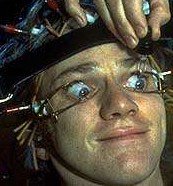The uncredited picture across the top of each page here shows William Blake's "Elohim Creating Adam."
What should we know, and how do we know what we should not know? That is the birth of tragedy. That is the nature of the telos of Man.
Roger Shattuck, 1923-2005
On the passing of a great man-of-letters.
This article originally appeared in
The New Criterion, Volume 24, January 2006, page 3
It is with sadness that we note the passing of our friend Roger Shattuck, teacher, poet, essayist, and literary observer par excellence. Roger was the sort of man-of-letters one reads about but scarcely encounters any more: literary to his fingertips, but graced with manly common-sense and instinctive independence of mind: a gentleman in the highest sense of that retired epithet. Roger was never part of any school or clique or movement. He regarded fads like deconstruction with amused distaste: something to hold one's nose about while disposing of it quickly and with as little comment as possible. His most famous book, in some ways his best, was also his first: The Banquet Years: The Origins of the Avant-Garde in France, 1885 to World War I (1958), a quirky, seductive, utterly original romp through the work of Henri Rousseau, Alfred Jarry, Erik Satie, and Guillaume Apollinaire. Roger made connections—made sense—out of themes and continuities that no one had sensed before but that now seem obvious. Roger's mind was omnivorous, as at home in anthropology and moral philosophy as it was in literature. He wrote on Proust; on "the Wild Boy of Aveyron," the feral child discovered in France in the nineteenth century; and all manner of literary controversy and incident.
One of Roger's most thoughtful and ambitious (and by accident most contentious) books was Forbidden Knowledge: From Prometheus to Pornography (1996), which began with the arresting question: "Are there things we should not know?" Today, shallow intellectuals bandy about words like "subversive" and "transgressive" as terms of endearment. But the age-old uneasiness about the subversive potentialities of unfettered knowledge reveal a recognition that knowledge can bring unhappiness and ruin as well as insight and liberation. This thought is embedded in countless myths and stories, many of which Roger anatomizes in the course of his book.
 Since the Enlightenment, it has been increasingly difficult for us in the West to give much credence to or even properly to understand the kind of moral-religious criticism that Augustine (for example) mounts against unfettered curiosity. We are increasingly secular creatures who rankle at the very prospect of there being "limits" to knowledge, let alone ones prescribed by any human agency. It is one of Mr. Shattuck's most impressive achievements to have been able to bring readers back behind this Enlightenment assumption and reanimate the kinds of questions posed by Augustine and the many authors he discusses, from Homer and Aeschylus to Milton, Melville, Montaigne, and Molière. In the "applications" part of his book, Roger concentrates on three cases studies: the decision to build and use the atomic bomb in World War II; the human genome project and the prospect of genetic engineering; and the question of whether certain extreme forms of pornography (the Marquis de Sade furnishes his chief text) ought to be controlled. Where do we find the authority to say the limit should be just here? Or here? Or here? There are no simple answers to the urgent quandaries that Mr. Shattuck illuminates in this impressive study. We must be grateful to him for bringing the questions to life once more. As the eighteenth-century aphorist G. C. Lichtenberg once observed, "Today we are trying to spread knowledge everywhere. Who knows if in centuries to come there will not be universities for re-establishing our former ignorance?"
Since the Enlightenment, it has been increasingly difficult for us in the West to give much credence to or even properly to understand the kind of moral-religious criticism that Augustine (for example) mounts against unfettered curiosity. We are increasingly secular creatures who rankle at the very prospect of there being "limits" to knowledge, let alone ones prescribed by any human agency. It is one of Mr. Shattuck's most impressive achievements to have been able to bring readers back behind this Enlightenment assumption and reanimate the kinds of questions posed by Augustine and the many authors he discusses, from Homer and Aeschylus to Milton, Melville, Montaigne, and Molière. In the "applications" part of his book, Roger concentrates on three cases studies: the decision to build and use the atomic bomb in World War II; the human genome project and the prospect of genetic engineering; and the question of whether certain extreme forms of pornography (the Marquis de Sade furnishes his chief text) ought to be controlled. Where do we find the authority to say the limit should be just here? Or here? Or here? There are no simple answers to the urgent quandaries that Mr. Shattuck illuminates in this impressive study. We must be grateful to him for bringing the questions to life once more. As the eighteenth-century aphorist G. C. Lichtenberg once observed, "Today we are trying to spread knowledge everywhere. Who knows if in centuries to come there will not be universities for re-establishing our former ignorance?"
****
The movie still above shows Alex the Droogie experiencing "the Ludovico Treatment" in A Clockwork Orange.



No comments:
Post a Comment